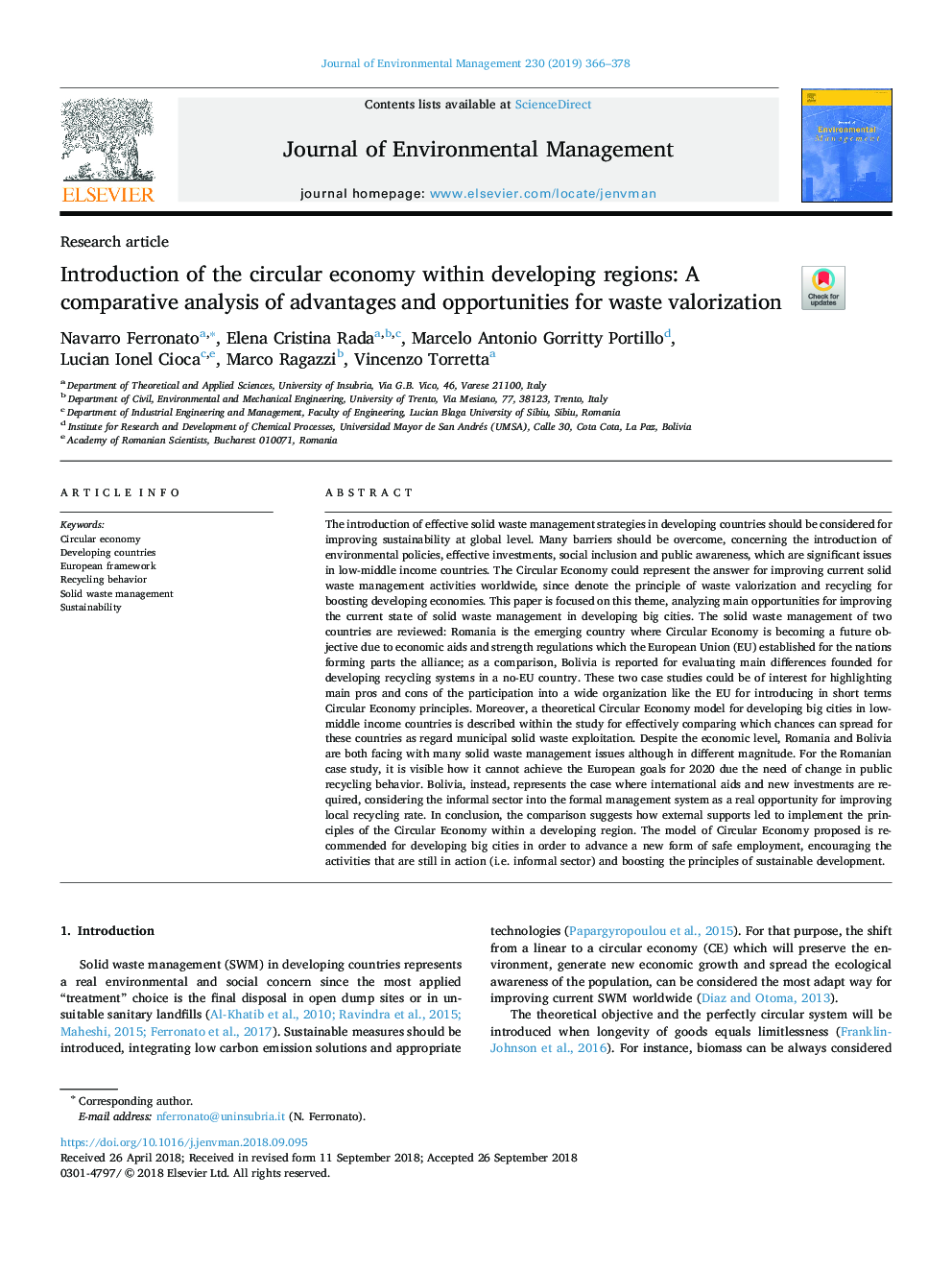| کد مقاله | کد نشریه | سال انتشار | مقاله انگلیسی | نسخه تمام متن |
|---|---|---|---|---|
| 11023257 | 1701321 | 2019 | 13 صفحه PDF | دانلود رایگان |
عنوان انگلیسی مقاله ISI
Introduction of the circular economy within developing regions: A comparative analysis of advantages and opportunities for waste valorization
ترجمه فارسی عنوان
معرفی اقتصاد مدور در مناطق در حال توسعه: تجزیه و تحلیل مقایسهای از مزایا و فرصتهای ارزشگذاری زباله
دانلود مقاله + سفارش ترجمه
دانلود مقاله ISI انگلیسی
رایگان برای ایرانیان
کلمات کلیدی
اقتصاد مدرن، کشورهای در حال توسعه، چارچوب اروپا، رفتار بازیافتی، مدیریت زباله های جامد، پایداری،
ترجمه چکیده
معرفی راهکارهای مدیریت مواد زائد جامد در کشورهای در حال توسعه برای بهبود پایداری در سطح جهانی باید مورد توجه قرار گیرد. در مورد معرفی سیاست های زیست محیطی، سرمایه گذاری های موثر، برنامه ریزی اجتماعی و آگاهی عمومی، باید مسائل بسیاری را حل کرد که مسائل قابل توجه در کشورهای با درآمد کم درآمد است. اقتصاد دایره ای می تواند پاسخی برای بهبود فعالیت های مدیریت جامع مدیریت زیست محیطی در سراسر جهان باشد، چرا که اصل ارزش زدایی و بازیافت زباله را برای تقویت اقتصادهای در حال توسعه نشان می دهد. این مقاله بر روی این موضوع تمرکز دارد و به بررسی فرصت های اصلی برای بهبود وضعیت فعلی مدیریت زباله های جامد در حال توسعه در شهرهای بزرگ می پردازد. مدیریت زباله های جامد دو کشور مورد بررسی قرار گرفته است: رومانی کشور در حال ظهور است که اقتصاد دایره ای به دلیل کمک های اقتصادی و مقررات قدرت که اتحادیه اروپا برای کشورهای تشکیل دهنده این اتحاد تشکیل شده است، تبدیل به یک هدف آینده می شود؛ به عنوان یک مقایسه، بولیوی برای ارزیابی تفاوت های اصلی تاسیس شده برای توسعه سیستم های بازیافت در یک کشور بدون اتحادیه اروپا گزارش شده است. این دو مطالعه موردی می تواند برای برجسته کردن جوانب مثبت و منفی اصلی مشارکت در یک سازمان وسیع مانند اتحادیه اروپا باشد تا بتوانند به طور خلاصه، اصول اقتصاد دایره ای را معرفی کنند. علاوه بر این، یک مدل اقتصاد نظری نظری برای توسعه شهرهای بزرگ در کشورهای با درآمد کم درآمد در این مطالعه برای مقایسه موثر است که شانس برای این کشورها در مورد بهره برداری از ضایعات جامد شهری گسترش می یابد. با وجود سطح اقتصادی، رومانی و بولیوی هر چند با مسائل مختلف مدیریت زباله های جامد روبرو هستند، اما در مقیاس های مختلف. برای مطالعه موردی رومانیایی، قابل مشاهده است که چگونه نمی تواند به اهداف اروپا در سال 2020 دست یابد به دلیل نیاز به تغییر در رفتار بازیافت عمومی. در عوض، بولیوی، نشان دهنده موردی است که کمک های بین المللی و سرمایه گذاری های جدید مورد نیاز است، با توجه به بخش غیررسمی به سیستم مدیریت رسمی به عنوان یک فرصت واقعی برای بهبود نرخ بازیافت محلی. در نتیجه، مقایسه نشان می دهد که چگونه حمایت های خارجی منجر به پیاده سازی اصول اقتصاد مدور در یک منطقه در حال توسعه است. مدل پیشنهادی اقتصاد مدرن پیشنهاد شده برای توسعه شهرهای بزرگ به منظور پیشبرد یک فرم جدید شغل امن، تشویق فعالیت هایی که هنوز در عمل هستند (یعنی بخش غیررسمی) و ارتقاء اصول توسعه پایدار توصیه می شود.
موضوعات مرتبط
مهندسی و علوم پایه
مهندسی انرژی
انرژی های تجدید پذیر، توسعه پایدار و محیط زیست
چکیده انگلیسی
The introduction of effective solid waste management strategies in developing countries should be considered for improving sustainability at global level. Many barriers should be overcome, concerning the introduction of environmental policies, effective investments, social inclusion and public awareness, which are significant issues in low-middle income countries. The Circular Economy could represent the answer for improving current solid waste management activities worldwide, since denote the principle of waste valorization and recycling for boosting developing economies. This paper is focused on this theme, analyzing main opportunities for improving the current state of solid waste management in developing big cities. The solid waste management of two countries are reviewed: Romania is the emerging country where Circular Economy is becoming a future objective due to economic aids and strength regulations which the European Union (EU) established for the nations forming parts the alliance; as a comparison, Bolivia is reported for evaluating main differences founded for developing recycling systems in a no-EU country. These two case studies could be of interest for highlighting main pros and cons of the participation into a wide organization like the EU for introducing in short terms Circular Economy principles. Moreover, a theoretical Circular Economy model for developing big cities in low-middle income countries is described within the study for effectively comparing which chances can spread for these countries as regard municipal solid waste exploitation. Despite the economic level, Romania and Bolivia are both facing with many solid waste management issues although in different magnitude. For the Romanian case study, it is visible how it cannot achieve the European goals for 2020 due the need of change in public recycling behavior. Bolivia, instead, represents the case where international aids and new investments are required, considering the informal sector into the formal management system as a real opportunity for improving local recycling rate. In conclusion, the comparison suggests how external supports led to implement the principles of the Circular Economy within a developing region. The model of Circular Economy proposed is recommended for developing big cities in order to advance a new form of safe employment, encouraging the activities that are still in action (i.e. informal sector) and boosting the principles of sustainable development.
ناشر
Database: Elsevier - ScienceDirect (ساینس دایرکت)
Journal: Journal of Environmental Management - Volume 230, 15 January 2019, Pages 366-378
Journal: Journal of Environmental Management - Volume 230, 15 January 2019, Pages 366-378
نویسندگان
Navarro Ferronato, Elena Cristina Rada, Marcelo Antonio Gorritty Portillo, Lucian Ionel Cioca, Marco Ragazzi, Vincenzo Torretta,
